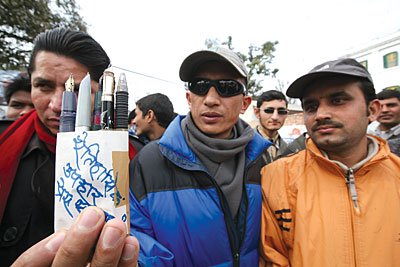 KIRAN PANDAY |
Kantipur Group chairperson Kailash Sirohiya has complained that he's received threats from unidentified groups over his organisation's coverage of the murder of fellow media entrepreneur Jamim Shah. The editor of Kantipur daily Sudheer Sharma and The Kathmandu Post editor Akhilesh Upadhyaya have also received similar threats through email and telephone.
Whether they have lodged a formal complaint with the police is not yet known. However, the media has rallied behind them. The Nepal Media Society, the Broadcasting Association of Nepal and the Advertising Association of Nepal decried the government's insensitivity towards the threats targeting some of the most prominent members of their fraternity.
But stringers in the countryside, including those associated with the Kantipur Group, have learnt to live under constant threat to their lives from identified and non-identified groups alike. Reporters have been mutilated, maimed and murdered in the line of duty. The practice of journalism in Kathmandu is somewhat safer only because what we do here matters less. That could be the reason threats to mediapersons in the city have set off alarm bells across the profession.
The only time in recent memory that journalists in Kathmandu lived under such threat was under Chairman Gyanendra's direct rule. Speaking the truth had been declared illegal, and several scribes were directly intimidated during the royal-military rule. Akhilesh and Sudheer may not have been in the line of fire then, but Kailash must have vivid memories of the agony of being surrounded by vigilante arsonists as the police ignored his desperate calls for help.
The threats were very real during such difficult times because the media mattered. With the ascendance of the Maoists into the formal structures of state power, the press has aligned itself with the forces of the status quo and lost its nuisance value. Since the declaration of a republic by the Constituent Assembly, the media has functioned more or less as the mouthpiece of the military-mercantilist establishment.
The threats to Kailash and his colleagues prove that the media house he heads retains its primacy in the public mind. Threats are the ultimate back-handed compliment: people fear coverage badly enough to issue a warning.
How the Kantipur Group will use its influence for the transformation of the Nepali polity and society remains to be seen. But irrespective of Kantipur's reach, important issues require the concerted efforts of everyone in the business of news. Sadly, media outlets in Nepal have different priorities and they seldom act in unison even on some of the most pressing or important issues of the day. Too often, news editors refuse to pick up and develop stories that rivals have broken.
A recent example will suffice. Nagarik daily recently uncovered evidence that an unusual volume of money was leaving the country in the general direction of Hong Kong. In a country where capital flight has emerged as the most challenging economic issue of the day, it would have been logical for Kantipur to use its considerable resources to get to the bottom of the story. But apart from a perfunctory report, the story was allowed to die.
It is not obligatory that media houses substantiate or extend each other's reporting. Sometimes an independent investigation may conclude that a story that has been broken is not quite what it is, and new leads may emerge in the process of exploring trends. For instance, one of the brash broadsheets here could easily have used its Indian links to investigate whether the money being invested by Nepali citizens in the housing market in New Delhi or the industrial belt of Uttarakhand is actually larger than the reported capital flight to Bangkok, Hong Kong and Singapore.
Solidarity evolves during difficult times and through manning the barricades for a common cause. Fraternity can develop with convivial competition between people in the same profession. Nepali media houses are yet to acquire the confidence to acknowledge each other with respect.



